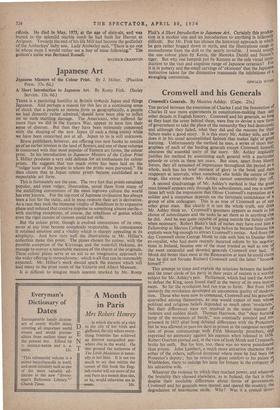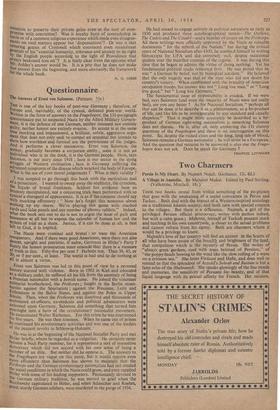Cromwell and his Generals
Cromwell's Generals. By Maurice Ashley. (Cape. 21s.) THE period between the execution of Charles I and the restoration of Charles II saw more experiments in constitution-making than any other decade in English history. Cromwell and his generals, so long as they kept the army behind them, were free to devise a new form of government to take the place of the monarchy they had destroyed; and although they failed, what They did and the reasons for their failure make a good story. It is this story Mr. Ashley tells, and he does it in his usual accomplished fashion that makes light of great learning. Unfortunately the method he uses, a series of short bio' graphics of each of the leading generals except Cromwell himself, obscures the essential unity of the story. Mr. Ashley implicitlY justifies his method by associating each general with a particular episode or crisis in these ten years. But since, apart from HearY Ireton, they all remained of importance throughout the period as a whole, each has his brief moment of glory in the book and then reappears at intervals, when somebody else holds the centre of the stage, like extras whom Mr. Ashley cannot conveniently pay off.
A second disadvantage of Mr. Ashley's method is that the great man himself appears only through his subordinates, and one is some- times left with the impression that Oliver Cromwell's reputation as a soldier and a statesman depends on the fortunate, coincidence of a group of able colleagues. This is as true of Cromwell as of any other great man. But clearly it is not the whole truth, nor does Mr. Ashley think so. Cromwell's greatness appears as much in his choice of subordinates and the tasks he set them as in anything else he did. And he, was quite capable of going outside the family circle when necessary. Robert Blake's lack of inches may have cost him a Fellowship at Merton College, but long before he became famous his exploits were big enough to attract Cromwell's notice. And from the day Cromwell chose George Monk to ride with him to Dunbar that ex-royalist, who had more recently incurred odium by his negotia- tions in Ireland, became one of the most trusted as well as one of the most successful and devoted generals Cromwell ever had. If Monk did better than most at the Restoration at least he could claim that he did not forsake Richard Cromwell until the latter "forsook himself."
This attempt to trace and explain the relations between the leader and the inner circle of his party in their years of success is a worthy subject for Mr. Ashley's pen. Parliament, which had used the Am/ to defeat the King, soon found itself at the mercy of its own instru- ment. So far the revolution had run true to form. But from 1650 onwards the revolution developed an uncommon quality of modera- tion. Those who were now in command, Cromwell and his generals, quarrelled among themselves, as one would expect of men whoee political and yeligious beliefs depended so much upon 'revelation.' But their differences were not resolved in the usual manner of violence and sudden death. Thomas Harrison, that "clear burning lamp of the mountain of battle," was eventually arrested and fill' prisoned in 1655 after long debated differences with the Protectors but he was allowed to pass his days in prison in the congenial occupa- tion of pious communings with Fifth Monarchy preachers, and expressed no animosity against his enemies when released in 1658. Robert Overton plotted and, in the view of both Monk and Cromwell, broke his oath. But for him, too, there was no worse punishment than prison. John Lambert, a much more attractive character than either of the others, suffered dismissal where once he had been the Protector's deputy; but he retired in great comfort to his palace at Wimbledon, there to indulge his taste for botany in the company of his attractive wife.
Whatever the violence by which they reached power, and whatever the brutality they showed elsewhere, as in Ireland, the fact is that, despite their insoluble differences about forms of government, Cromwell and his generals were spared, and spared the country, the degradation of internecine strife. Why? Was it a cynical deter- urination to preserve their private gains even at the cost of com- Promise with conviction? Was it loyalty born of comradeship in battle or of a common religious experience which made even disagree- : Inents on vital matters appear but `dispensations'? Or was it that . ' towering genius of Cromwell which convinced even recalcitrant generals of his "essential humanity, tolerance and anxiety to do right by the English people according to the light of Providence that always beckoned him on"? It is fairly clear from the epitome what Tr. Ashley's answer would be. It is a pity that he does not make that answer from the beginning, and more obviously, the framework for the whole book.
N. H. GIBBS



































 Previous page
Previous page